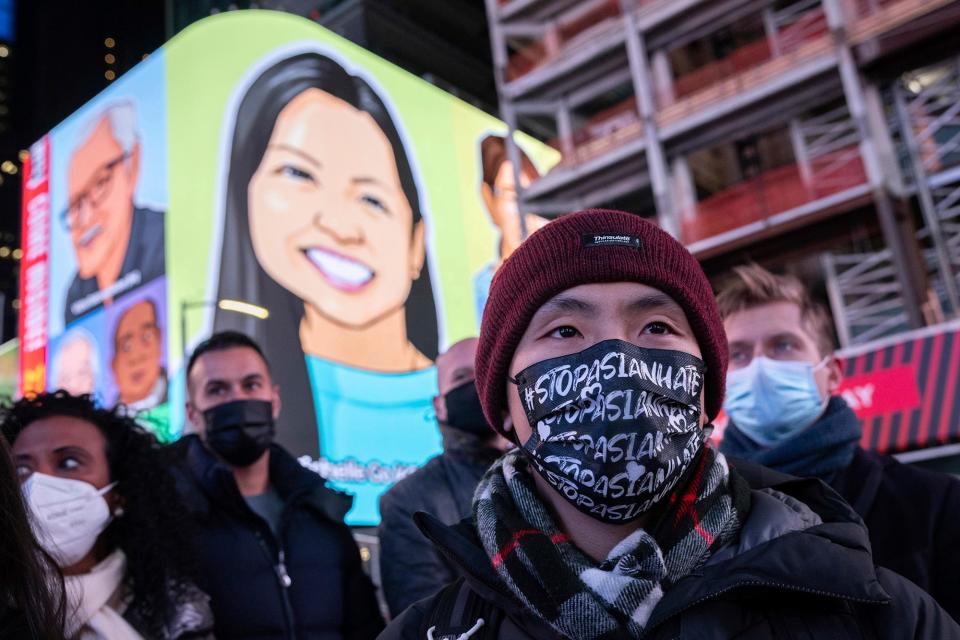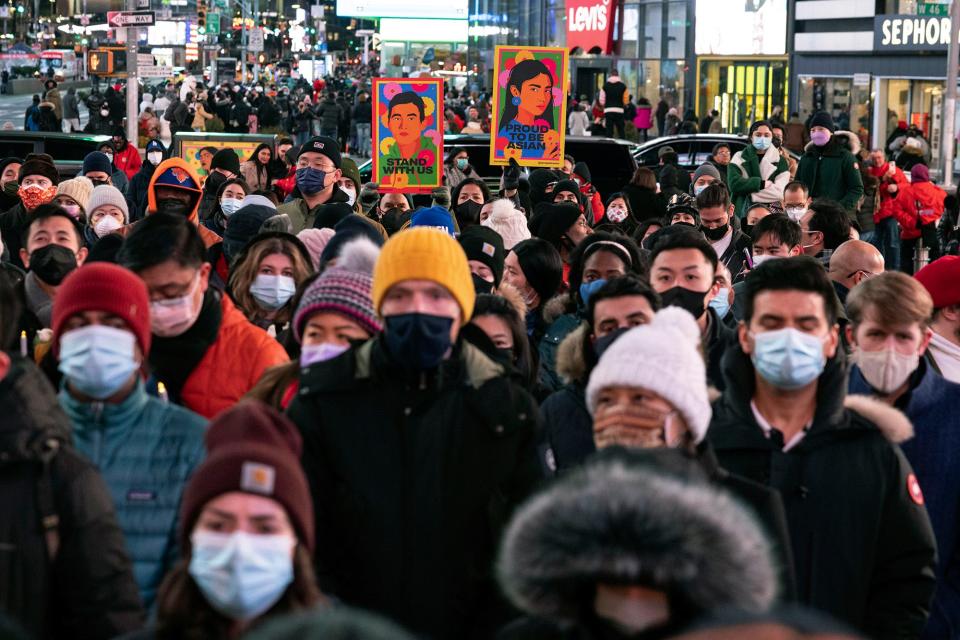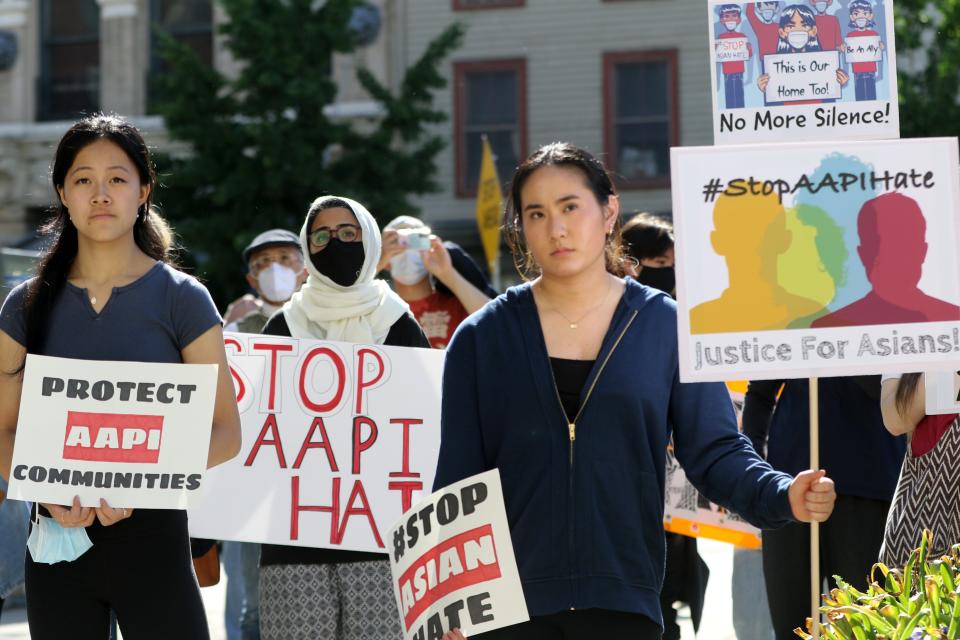NYC subway death touched a raw nerve for Asians still reeling from hate crimes | Mary Chao
It happened again.
A homeless man shoved an Asian American woman in front of an oncoming subway train in New York City this past weekend. Michelle Go had just celebrated her 40th birthday when she was pushed to her death.
Police so far have not classified the horrifying incident as racially motivated. The 61-year-old man charged with her killing reportedly has a history of mental illness. Nonetheless, Go's death touched a raw nerve for an Asian American community that has endured a string of attacks during the coronavirus pandemic.
Two years after the pandemic started in Wuhan China, crimes against Asians and Pacific Islanders continue at an alarmingly prolific pace. There's not as much national media attention as there was a year ago, when the violence reached a crescendo with a deadly shooting spree in Atlanta. But many in our area continue to live in fear.
More than 10,000 hate incidents against Asian American and Pacific Islanders have been reported nationally since March 2020, according to the latest data from the nonprofit group Stop AAPI Hate. In New Jersey, almost 1,700 bias incidents were logged in total from January to November 2021, according to state police statistics. Of those, 121, or 6%, were classified as anti-Asian.

My heart goes out to Michelle Go and her family and friends. I couldn't stop reading about her and her love of New York City and travel, or gazing at the photo showing her smiling, full of life.
She could be me. Or any one of my Asian American girlfriends.
AAPI women are prime targets of hate and discrimination, according to Stop AAPI Hate. Women report hate incidents 2.2 times as often as men.
It's a deep-seated fear for me as an Asian American woman who frequently travels to New York City to shop, see a play or visit family. During the holiday season, I took in a Broadway show and explored the city and at one point stood alone in the same Times Square subway station where Go was pushed to her death. I know that incidents like this are rare, but fear is irrational.
It's what stops Asian Americans from living our lives fully, free from anxiety. It's the boogeyman hanging over us, thinking we could be next.
AAPI curriculum: Murphy signs bills making NJ second state to implement Asian American studies curriculum
Education milestone: New NJIT president is first person of color to lead one of state's most diverse colleges
Grace Kim, 25, who is a family owner of a Fort Lee nail salon, reflected last year on how vulnerable she felt after the attacks that killed six Asian American women in Atlanta in March. Because the gunman targeted Asian female-owned businesses, she feared copycat crimes.
Asians have become targets during the pandemic, after being blamed for its origin. Asian Americans feel we are labeled with the "forever foreigner" stereotype, no matter how long we have been in the United States.
I get my share of vitriol as a columnist who operates in the public eye. "You're pathetic," wrote one reader recently in response to my story celebrating a new Asian American college president. "That looks like bat in the steam pan," wrote another, reacting to a photo of Filipino food. I often wonder if people think I and other Asian women are easy targets because we have been portrayed in Western media throughout history as meek and docile.
Often, it's a snide remark. And then there's outright hostility. J. Ma, of Palisades Park, wrote to me recently about her own experience with prejudice. During a tour of an apartment complex this past week in Cliffside Park, Ma said she was assaulted with racist comments by a woman who appeared to be a resident there.

Ma, 31, said she dropped an antibacterial wipe near her parents. The female resident allegedly pointed at her parents and told the family to "pick up your dirty tissue and take your coronavirus back to where you came from." She then told the attendant at the front desk that "those dirty people should be reported to the police."
"I considered letting it go, letting it slide, and just hoping that this never happens to me, my family, or anyone again, but I do not believe silence serves anybody or the community-at-large," Ma told me in an email. She asked that her full name not be used for fear of retaliation.
According to Stop AAPI Hate data, verbal harassment and shunning — the avoidance of Asian Americans and Pacific Islanders — continue to make up the biggest share of incidents, at 62.9% and 16.3%, respectively. Physical assault (16.1%) comprises the third-largest category, followed by online harassment (8.6%).
Civil rights violations such as workplace discrimination, refusal of service and housing-related discrimination accounted for 11.3% of the reports.
Ostracism takes many forms. Despite having lived in the United States for 25 years, Ying Lu, 49, of Princeton, never felt she fully fit in. An applied statistics professor at New York University, Lu said she fits the stereotype of being an Asian who is good at math and is relegated to that role.
Since the pandemic began, Lu has felt even more excluded. She recalls shopping at a local delicatessen early in the pandemic and a line of customers moving away from her. It's a constant reminder that she is an outsider, even though she is a citizen of this country.
A spate of heartbreaking crimes against Asians occurred just within the past month. In Manhattan last week, a 59-year-old Korean man trying to be a good Samaritan was attacked and mugged when he placed a coat on a homeless person. In Chinatown in Oakland, California, an elderly Asian couple was assaulted and robbed the day after Christmas by a suspect who escaped in a getaway car. Imagine if that was your mother or father.

Although there's no direct evidence that these crimes are racially motivated, there's no disputing that the victims are, indeed, Asian Americans. The incidents have touched a nerve in a population already on edge.
The fear is real in Asian American communities. Chris Chung, the Korean American mayor of Palisades Park, told me in October that elderly Asians are afraid to leave their homes, and their families worry about their safety. Almost 60% of the residents of Palisades Park identify as Asian.
Sadly, crimes against Asians in America no longer shock us to the core. After the Atlanta massacre led to protests nationwide last year, national mainstream media slowed its coverage, moving on to other topics. As a nation, we have a short attention span, very quickly accepting the unacceptable as the norm.
As the country continues to grapple with a pandemic going into its third year, the scapegoating of Asians must stop. Local leaders talk the talk, but real solutions are needed to stop Asian hate. One solution might be to have more undercover police officers in neighborhoods with big Asian populations. Perpetrators should also be prosecuted for racially motivated harassment instead of having their actions just brushed off as microaggressions.
Municipalities with large Asian populations also should have multilingual task forces that specifically deal with harassment of Asians. Immigrants who are vulnerable feel more comfortable speaking with people who understand their concerns.
Enough is enough. Asian Americans contribute greatly to this mosaic country of ours. It's time that our government and our elected officials treat us with the respect and protection that we deserve.
Mary Chao 趙 慶 華 covers the Asian community and real estate for NorthJersey.com. To get unlimited access to the latest news out of North Jersey, please subscribe or activate your digital account today.
Email: mchao@northjersey.com
This article originally appeared on NorthJersey.com: NYC subway death: Michele Go hits nerve for Asian Americans

